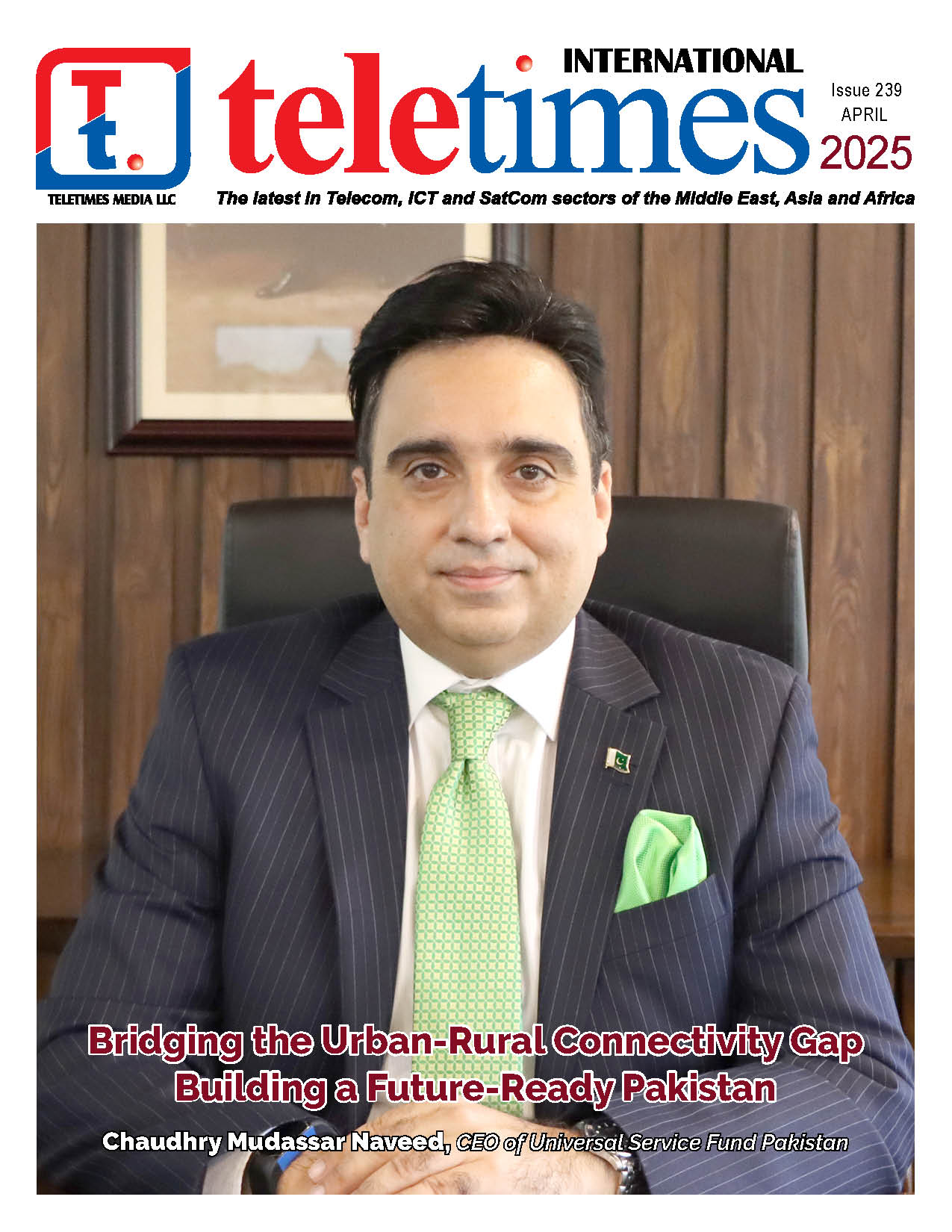Alex Lee, Managing Director – China Mobile International ME speaks to Teletimes International
Khalid Athar: What are the key objectives of China Mobile International (CMI) in setting up an overseas operation in the Middle East?
Alex Lee: The Middle East, especially UAE and Saudi, are key important countries along Belt & Road initiative. Growing number of Chinese companies who had come to this region so we find the demand for a reliable service provider who can offer them with a one-stop-shop information technology service, and speak their language is quite important for them. Therefore, leveraging on our network resources, and experience, we are able to offer them the solutions to expand their business in the Middle East. At the same time, with the latest technology development in China, we can share these with the other regional and local companies.
KA: With 5G being a major buzz word in the industry, especially within the Middle East, how do you think 5G will be the game changer in the telecoms industry besides much faster speed?
AL: 5G definitely will be of a much faster speed than 4G, but it is so much more than just speed. With 4G today, most of us are already enjoying a very high level of experience in using the mobile internet and applications, so having 5G will not actually enhance the experience significantly especially on speed on the very same applications we are commonly using today. Its improved quality of the latency along with the speed, will enable a whole new range of applications, which are known but not commonly seen today, such as cloud gaming experience, driverless cars. Therefore, we always say “5G+”. The true potential of 5G can be unleashed together with AICDE, i.e. IA, IoT, Cloud computing, Big Data, and edge computing, to develop the application in the industry.
5G connected ambulance, driverless cars and uber, drones for supporting fire and police department and other public services, smart harbours will also be one of the first adopters of 5G. 5G will also provide the network foundation for the internet of things (IoT) for a smart city, smart factory, smart office and smart home.
On another very useful application of 5G, is the ability to privatise the network for public services and large enterprises to have full security and control, and yet not have to maintain their own costs of managing such a network. We believe this will be a very common usage seen in the coming future.
KA: What are some of the challenges being faced by carriers during the rollout of next generation 5G base stations across the region and how can they overcome them?
AL: The one and all key challenge for carriers rolling out 5G will be seeing the clarity of the RoI (return of investment) on how their cost investments into rolling out 5G network can be recovered.
There are many elements of cost demand in establishing a new technology network, and for 5G especially, we noticed that one of the key cost increase is the significantly higher electricity consumption of 5G network. To overcome that, CMI is introducing to a number of partners our 5G BTS power backup solution, an integrated power cabinet, that has already been deployed in 29 provinces in China and achieved national coverage of 90% in the past year. It significantly brings down the OPEX and CAPEX costs of maintaining the 5G towers. The integrated base station power system is also able to support four to five base stations at once, allowing carriers to reduce operation and maintenance workload by 30% to 40%.
Besides managing the cost, the key portion is still looking for return on investment. While there are some tractions on consumers using 5G, the big portion of the market that will contribute to this return will be the enterprises who will use the 5G network to establish an entire new efficient manner of operations. From our experience, carriers will have to work in partnership with the key large enterprise to provide a 5G end-to-end solution, including network sliced private 5G network, to convince them the
5G network is a lot more effective and efficient than using their existing private network. Unfortunately, this process is a long drawn process. Our group company, CMCC, had started this activity with a number of key enterprises in China, and we are glad to see a growing number of successful usage cases in China.
KA: Are there any key projects that China Mobile International in the Middle East in pushing forward 5G implementation?
AL: As a matter of fact we do, but they are still in a very exploratory preliminary stage. One of our most successful showcase technology of 5G is our 5G Smart Port complete solution, we have shared our experience and knowledge with some of the regional port operators, and has generated a lot of interest in bringing the complete automation and AI into this region. Another area of 5G, is the usage of 5G UAVs, which by itself enables a lot of applications in many different scenarios.
In China, CMCC has more than 40 different used case scenarios, and the best thing is that carriers do not need to implement private 5G network, or SAs to enable the UAVs to work. A number of key enterprises are interested in these, and we are also providing consultation to them. In terms of 5G applications for vertical industry sectors, CMCC has developed more than 100 industry-leading showcases in China.
KA: With technology emerging as a superhero of the COVID-19, how do you think China Mobile International can play in building a more resilient ecosystem in the region?
AL: The pandemic highlighted the urgency and importance of digitization, and 5G is considered one of the underlying layers to build for this change. Rolling out 5G has always been a key focus for this region, and COVID-19 has simply become the catalyst to accelerate this process. In the past, it was not very clear to many enterprises how soon they should adopt digitalisation and new technologies, pandemic had brought across the message it is now, and ongoing.
CMI has forayed into digitalization, 5G, Io T, Cloud and a number of digital technologies even before the pandemic, and the pandemic had sped up the take up of these new products and services. We are always glad to share our experiences to anyone interested. Also, the other ecosystem players are themselves very established and knowledgeable, I believe mutual sharing of experiences and working in closer partnerships will certainly help the faster development of better digitalization solutions for all.
KA: Can you shed some light on some of the significant partnerships CMI has formed in the region for cooperation in ICT Technology?
AL: We had actually only been here for slightly more than 3 years, but we are very glad to have established great partnerships with a number of carriers and enterprises in this region. Specifically, on the ICT front, we had worked with more than 30 enterprises located here, and provided them with one stop shop service, scaling from a complete office ICT infrastructure to a complete warehouse ICT infrastructure, right up to implementing complete smart infrastructure for Smart Parking.
KA: Do you think that the Middle East can prove to be a fertile ground for cloud computing and what role do you think can CMI play in this?
AL: I think it’s not just the Middle East, but the world will most certainly move towards greater and greater migration towards cloud services. Also, we see there are very smart people in the industry and governments here, and they recognize and know that cloud is the future.
CMI had already recognized this and have established special relationships with all the major cloud providers, which we offer to all through our multi-cloud platform that enables our customers to have one integrated cloud billing. Services can be purchased from any of the public clouds instantly using a credit card through our platform. More importantly, they may have a free trial before making purchases and take advantage of discounts that they may not get by other means.
KA: What are some of the challenges that you and your team have encountered in setting up CMI in the Middle East?
AL: There are obviously cultural differences between how a Chinese entity works with the companies who had been operating in this region for quite some time. As the saying goes, culture eats strategy for breakfast. We needed to adapt our style, our strategy very quickly to be in line with the operation customs in this region, bridging this gap in culture and working style was indeed one of the key challenges.
In order to bridge this gap, I have a very international team working with me. We have 8 different nationalities in our small team of 17 people here, and we work very well together with mutual respect and understanding. In fact, management had seen the potential and benefits of our operations here, that they will be setting up the regional management of Middle East Africa to be based out from Dubai.
KA: What are some of the key benefits for any enterprise or company to work with you and procure your services and products?
AL: Firstly, we truly live by the motto of “Putting customers at the center of all our thoughts” We fully understand and structure everything that we do around servicing the needs of the customer as much as possible.
At the same time, with the experience of serving over 942 million subscribers, we believe our expertise can facilitate our customer to develop their footprint around the world. So when you work with us, you know you are with an absolutely reliable partner.
Last but not least, we have a small team of dedicated and very experienced experts in their own field, who lives by CMI’s culture of “TRY”, maximizing Trust, Responsibility and Care for you. And we also know how to have fun, while we work hard. What more can you ask for?










